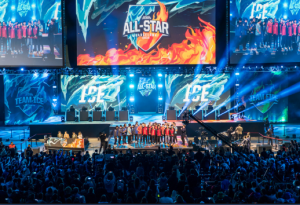E-sports refer to video games played by professionals. This has become a major phenomenon in the modern world, with millions of dollars in bonuses, and professional gaming superstars receive sponsorship contracts and similar privileges as real athletes.
But it is not always like this. E-sports has been a very appropriate pursuit, but has grown and is increasingly gaining momentum over the years. So, first of all, create a bit of nostalgia and look back at the origins of E-sports, before moving on to assess how big a professional game has become recently.
Modest origin of E-sports
Shooters, in a word. This is where all begins in the nineties. Certainly, since video games have always been competitive, we are not talking about trying to get the highest score on the Space Invaders as seen at Atari’s 1980 event. , the national final was attended by more than 10,000 gamers across the US and was won by Bill Heineman.

Yes, this is an impressive milestone in competitive gaming – but not professional gaming, we argue. These gamers are not directly confronting such, but are competing with high scores, and furthermore, there are no great prizes. According to all accounts, Atari’s title award is a table video game of Rocket; quite neat, but it’s not Ferrari.
We mentioned the second issue, because what we (and others) consider the first real E-sports tournament to have a Ferrari award – the exact award of John Carmack (of the id Software). This happened in 1997, with the car won by Dennis Fong (nicknamed ‘Thresh’), who won a Quake tournament called ‘Red Annihilation’.
Quake – and QuakeWorld, have facilitated the more popular online shooter by adjusting the network code to make everything (mostly) playable on the dial-up modem – then helped to boost the playing context. Online games compete, with a myriad of amateur tournaments and homegrown competitions (like the United Kingdom Federation in the UK, to choose a scene we have joined – by the way, are there any QPD people?
And then professional agencies appeared, such as the Cyberathlete Professional Federation (CPL) and AMD Professional Gamers Federation (PGL), both founded in 1997, the same year as the antics won the Ferrari of Thresh.
